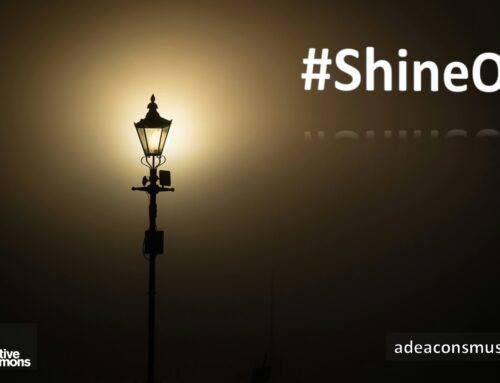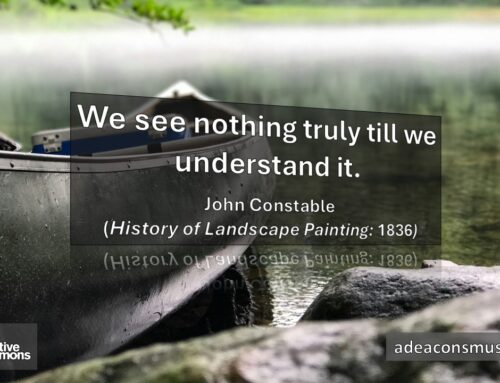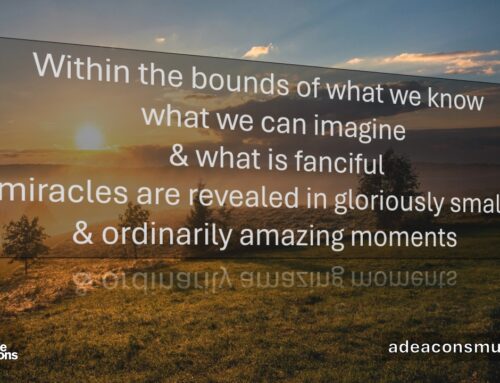A rationale of ‘Cause & Effect’ can distract.
Change is inevitable:
it is the cause that leads to awakening choice.
What follows is effect
(A Pres-bit|@wpgpres)

Well … I’m back! Thanks to everyone for your emails, PMs, tweets and such. Your well wishes, inquires about A Deacon’s Musing (ADM) and general interest have been a gift indeed to receive. This time of transition has been filled with much import, challenge and gift … so thank you!
For those of you for whom ADM is new, I have begun a new journey in respect to my ministry with The United Church of Canada (UCC). For the last six years and a bit, I have walked with the congregation, The United Church in Meadowood (UCiM). That journey has seen moments of joy and celebration, tears and anger, new life and death. The cycle of life has been experienced in multiple ways that though it may possess a rhythm – of sorts – there has certainly been a constant reminder that surprise is more often the norm than our human longing for predictability.
As I pen this week’s blog, I’m in my new office at Winnipeg Presbytery (WPG). This new role is quite different – more organisational in nature and not intimately bound to the life-cycle that one finds within a faith community. This new role allows me to ask questions, help nurture new ministries and explore ways to share the Hope that we Christians call the Good News. It’s certainly been anything but predictable and – obviously not surprisingly – I’ve been wondering about change, control, risk and predictability. And – in some convoluted way – how this speaks to discipleship within a Christian community and leadership in general!
There are certainly many questions we can ask about our experience of change. What strikes me is that regardless of whether change is intentionally planned or happens through the serendipity that is life, it’s inevitable. Careers, birth, relationships, illness, surprises and death: these are the milestones markers about where we have been, what influences our present and affects where we might be heading.
As a faith community, Christians hold this paradox central to our faith. In death, life is possible. In the place of suffering, there is hope. When power seems absent, agency and opportunity flourish. Where there is deficit, there is abundance. It’s what we believe … it’s how we roll … or such is that to which aspire.
And if these binaries and paradoxes frame some of our faith, I wonder whether and/or to what degree we believe that narrative? Life is always in flux no matter the illusion or story to the contrary. We might discuss our organised institution of faith – congregation, Presbytery, Conference or General Council – in respect to change. Or, perhaps, our own discipleship in respect to the inevitable nature of life. We might even explore leadership outside of the walls of organised religion. Regardless of the lens through which we view change, it is inevitable that it will occur and often we will lack control. Yet, what our own agency provides is the possibility to respond differently than what might be our norm or what might be expected of us: In the face of loss, we may recognise celebration; in the place of scarcity, perhaps we awaken to abundance; and, in the possibility of violence, perhaps an option for reconciliation might be borne. And yet – in these few examples – choice lies central. I do not want to deny nor sugar-coat that life’s changes sometimes are painful, require reflection, lament and perhaps even anger. And after we experience what we need to experience, emote the way we need to react, what next?
Questions … and regardless of the answers, do you want to know you possess the power to change your world? Within you, the potential to alter another’s life is intrinsic to your being? We can be tempted to see life as simply the cause and effect to which we are tethered. But … what a great conjunction … but when you, when we, realise choice is possible, well I wonder what might happen next …






The ability to provide leadership through the change event often helps people over come the fear that comes from the lack of control we have with change.
Hi Peter,
Thanks! You’re absolutely right about the effect that a leader has in regard to change. Whether as an organisation or in our own lives, it is those people who are mindful and present who can help us navigate it well and – hopefully – come through it with both learning and a deeper sense of vitality!
Thank you Richard! Developing our discipleship to accept that we often don’t have control of things should be a continual effort! I think we need the constant reminder about the lack of control. I need to take 10 minutes more often than I do!
Andy is a very interesting speaker! Thanks for your blogs!
Heya Andrea,
Thanks for the reply! 10 minutes extra is a pretty great idea. Do you think it will help or is it something you already do? Making it a conscious practice – as a discipline – is pretty cool!